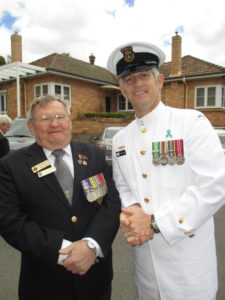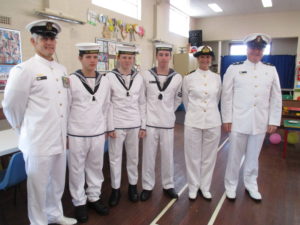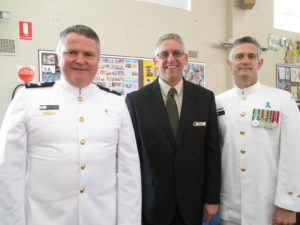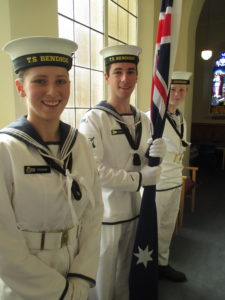Guest preacher, Rev Stuart Withers (Rochester Presbyterian), preached from three main texts in his message on the importance of prayer (Philippians 1:9-11, Romans 15:30-33 and Colossians 4:2-6.). Just as Paul exhorted us to make ‘all kinds of prayers for all the saints’ (Ephesians 6:18), so also in these texts we are reminded that prayer is the key for the encouragement of God’s people, the strengthening of His gospel workers and the means by which unbelievers are brought into the Kingdom of God. Great things happen when God’s people pray!
Guest Speakers
‘More than Conquerors’ (Romans 8:18-39)
Rev Ian Brown preached from Romans 8:18-39, where we are encouraged to see beyond our suffering to our hope which comes through Jesus’ death and the life that comes in his resurrection. Our salvation is not based on our own goodness or anything else but Jesus. We groan under the weight of sin and long to see Jesus face-to-face. Yet we already have this inheritance and it shapes our prayers and our life now.
‘Meeting Jesus’ (John 4:1-42)
Guest speaker Len preaches from John 4:1-42. Jesus has an appointment to pass through Samaria, but the woman he meets needs that meeting. This passage about the Woman of Samaria is all about Jesus and his character – he did not see people as others did. How do we see people? Do we offer hope? Jesus asks the women for a drink from the well but offers her living water (compare with John 7). This living water is his Holy Spirit, that Jesus’ saving work at the cross might be applied to our lives. As the passage goes on, we learn more about who Jesus is. The woman – of low standing and bad reputation – realises that Jesus is the Christ, she has received forgiveness and forgets her task at the well to tell the whole town. Be sure that you have met Jesus. Like Jesus, be no respecter of persons (looking up or down on anyone). Drink deeply of that living water that you cannot help but speak of it!
‘The Parable of the Rich Man and Lazarus’ (Luke 16:19-31)
Rev Dr Jared Hood preached this message from Luke 19:16-31, reminding us that we live in a world where materialism and ‘worldliness’ seems to be everything that people strive after. But Jesus unmasked the whole idea of worldliness through this parable. The Rich Man had everything. He was clothed with purple and fine linen, but treated Lazarus, a beggar at his gate, with contempt. The real nature of worldliness is callous, selfish and idolatrous and it leads to death not life. Sadly the core of a worldly lifestyle is rebellion. Those who do not want to believe will be not be convinced even if there was the best evidence available – such as someone rising from the dead! The cure for worldliness is to humble yourself and submit to God in repeantance and faith.
‘Reformation Celebration 2016’ message by Rev Dr Jared Hood
In this message on James 2:14-26, preached at our Reformation Celebration held at Eaglehawk PC on October 30th, 2016, Rev Dr Jared Hood explores the topic of the believer’s justification and whether it is by faith (as taught by Paul) or by works (as taught by James). Is there a conflict or do the two fit together? Or is something else the basis of our justification? And if so, where do works fit in?
‘The surprise of the centurion’s faith’ (Luke 7:1-10) Rev Miles Fagan
Life has many surprises. So do the Scriptures. One of the great surprises in the New Testament is found in the unfolding conversation between the Roman centurion and the Lord Jesus. Although it appears that they never actually met in person, there was a great interaction between them, especially concerning the centurion’s servant’s ill-health. But while the approach the centurion made to Jesus was surprising, so also and even more was the surprising result of the faith the centurion exercised in Jesus that day. The same holds true for any and all who come to Jesus with the kind of faith the centurion knew.
Also, below are some ‘snapshots’ of our Naval Service 2016!
‘What to think and do about tragedy’ (Luke 13:1-9)
Theories abound as to the link between the suffering that happens on earth and the sin of people. Some say that God always punishes the worst and rewards the best. In Luke 13:1-9, Jesus put this theory to rest. When asked about the aftermath of Pilate’s depravity and the collapse of the Tower of Siloam, Jesus pointed out that the need of the hour was repentance rather than guessing the cause of the tragedy. God does not treat as as our sins deserve. National or personal disasters are a ‘wake up call’ to all, regardless of who is ‘good’ and bad’. Instead we are to produce fruit in keeping with repentance.
Reformation Sunday Celebration with Rev Dr Douglas Milne (Hebrews 13:7)
At our Reformation Sunday Celebration, Rev Dr Douglas Milne preached from Hebrews 13:7, reminding us of the great legacy left behind by the Christian leaders of the Reformation and of those who have walked with God in days gone by, encouraging us all to imitate their faith by trusting in the Lord Jesus to the end.
‘The cradle and the cross’ (Luke 23:13-49)
Len Pearce spoke from Luke 23:13-49 about the connection between Christmas and Easter.
‘Keeping the miraculous alive in the Christmas story’ (Luke 2:15)
In this message, Rev John Sutherland explores the often overlooked aspect of the miraculous parts of the Christmas story in Luke’s gospel with the hope that believers may have a greater sense of wonder and awe at the great events that make up the birth of Jesus. We have no need to apologise that the very basics of our faith are founded on miraculous events, no matter how many of our own generation may scoff at these things. In our minds we can readily join with the shepherds who had seen the vision of angels and who received the glad tidings of the Saviour’s birth. “Let us go now to Bethlehem and see this thing that has come to pass.”




